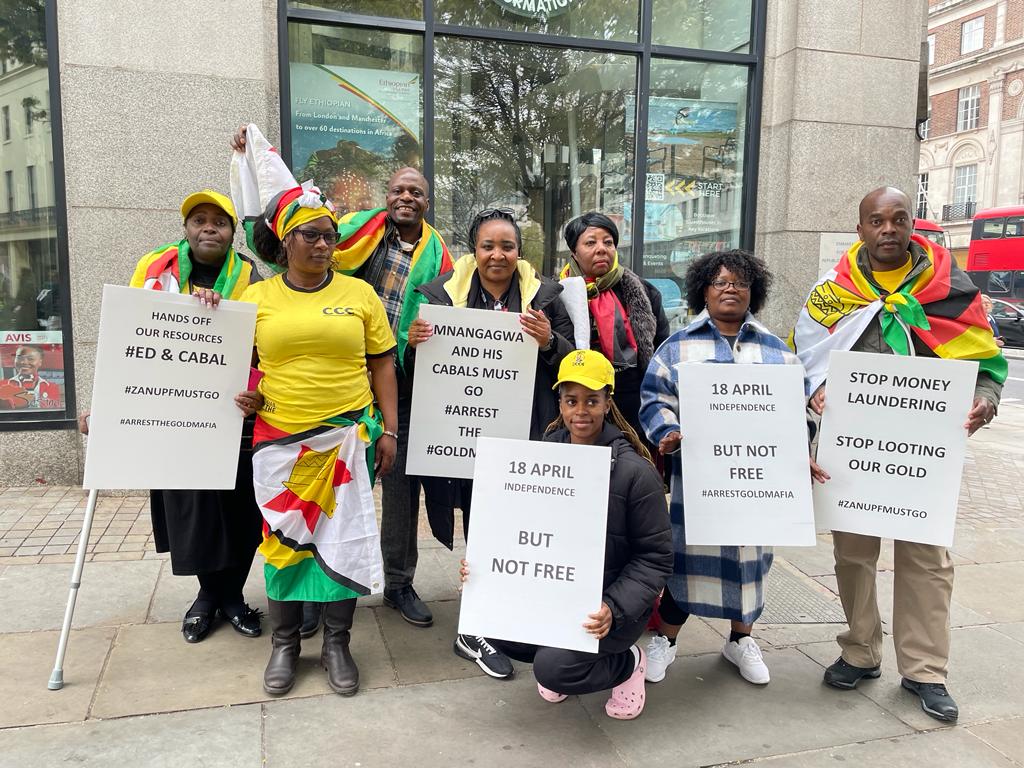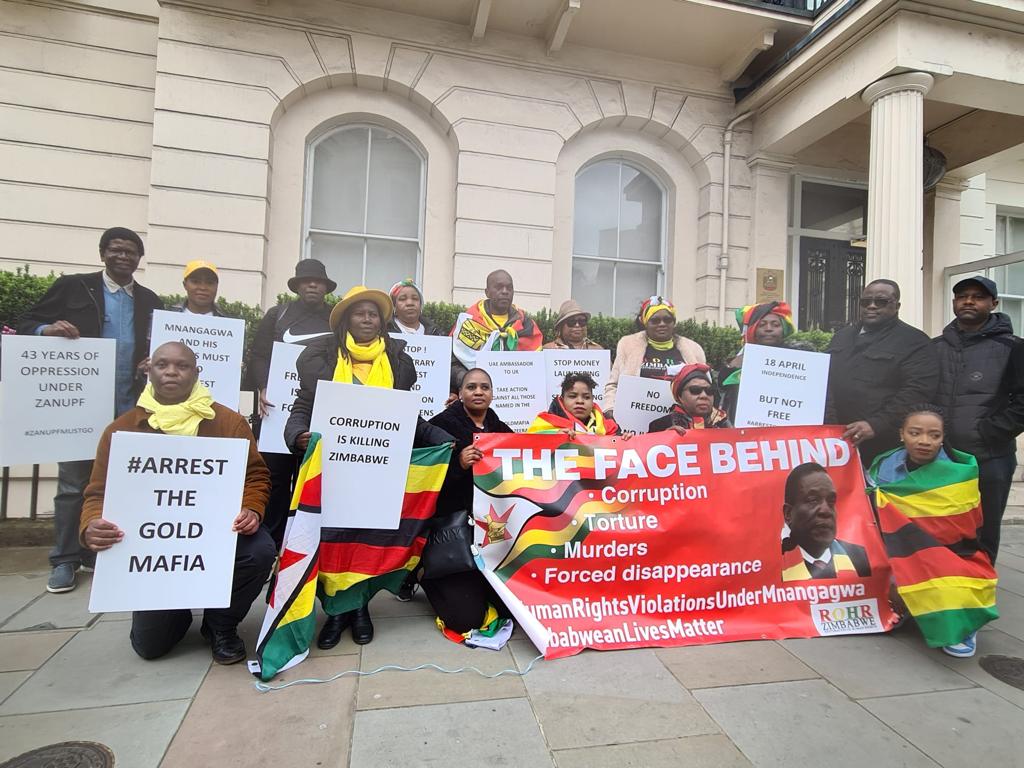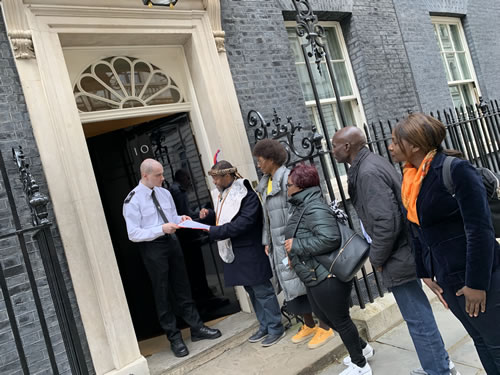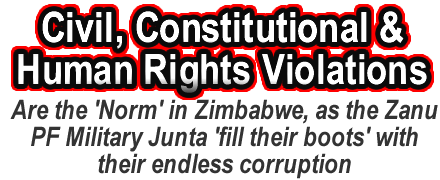 6:30am London; Several hardy and brave Zimbabweans from Glasgow, Manchester and Newcastle arrive at Victoria Bus Station - most getting onboard at 23:50 on the 17th April - traveling overnight! 6-7 hours travel.
6:30am London; Several hardy and brave Zimbabweans from Glasgow, Manchester and Newcastle arrive at Victoria Bus Station - most getting onboard at 23:50 on the 17th April - traveling overnight! 6-7 hours travel.
10:30am A good number of Zimbabweans, including some of the early birds above, congregate outside the UAE Embassy located in the prestigious address in 1-2 Grosvenor Crescent, London, SW1X 7EE - very plush, close to Harrods and Belgrave Square. This reflects the prestige of the UAE {Dubai} and its wealth - let's not forget that Dubai's success is recent in historical terms. The Persian Gulf War of 1990, in which Dubai as part of the UAE provided military aid to the coalition, unsettled the economy; however, in the mid-1990s this stabilised and many foreign trading communities moved their businesses to Dubai. Now Dubai is synonymous with wealth now. But has no more resouces than Zimbabwe.
 Their approach to wealth and luxury has been ruthlessly exploited by the regime, the #GoldMafia has been drawn like moths to a flame, to Dubai.
Their approach to wealth and luxury has been ruthlessly exploited by the regime, the #GoldMafia has been drawn like moths to a flame, to Dubai.
By 12:00 noon the masses of Zimbabweans were camped out at the Zimbabwe Embassy at 429 The Strand, London. We passed around a register of those present, 66 people completed their details. but I know personally of 5-6 who did not get round to adding their names. Others, too have mentioned various missing personalities. Only time will tell.
13:30: As a group a procession formed and we perambulated the short distace to the South African High Commission on Trafalgar Square, London WC2N 5DP. Our group sang and chanted on the street outside. Chief Ndiweni and a few others ventured inside. They were met with a sympathetic ear - as the Petition was e-mailed to the SA Hign Commission in the morning of the 18th. One of the Counsellor's at the High Commission had received the petition with thatnks and the message, and circulated to His Excellency Jeremiah Nyamane MamaboloHigh Commissioner to the United Kingdom of Great Britain and Northern Ireland and other key staff.
Dear Chief Ndiweni
This serves to inform that the South African High Commission acknowledges receipt of the documentation handed over on 18 April 2023.
Your kind understanding is appreciated.
Our appreciation and the sympathetic responce at the High Commission was well recieved by all who had met there. We then continued along the edge of Trafalgar Square and onto Whitehall towards the entrance to Downing Street itself.
14:00: Much discussions and conversations centred upon the 43rd anniversary of the {not} Independence Day, and the task ahead to gain International recognition and condemnations as to the #GoldMafia exposition. This view was ably argued within 9 pages of the Petition itself. {Click Here to View or Download} The main body of the demonstrators now established an 'encampment' next to the statue of Lord Montgomery and proceeded with song, music and speeches.
At the same time the group of 6 petitioners were ID checked into the Downing Street security perimeter by the Metropolitain Diplomatic Unit - in their normal and friendly manner! This in itself is in stark contrast to the lowly and politically motivated 'police' in Zimbabwe. Inside the security net the 6 petitioner were entertained with a history lesson regarding the 800 year old architiectural heritage within the sight of 10 Downing Street itself.
 The Petitioners then had time on their own to take photos and discuss their objectives. At the same time no overt police 'supervision' was percieved by those present. After a while the group knocked on that door - 10 Downing Street and handed over the petion to the staff member inside - indeed he was happy to be photographed with the petitioners as can be seen in the Flickr Album of the 18th April 2023 {Click Here} - Of note, and as at 6:30 am on today {19th April 2023} the Twitter Post of this handover has been viewed 20,900 times and still climbing. {see Tweet here}. As 16:00 on 21st April 2023 now 79,000 Views!
The Petitioners then had time on their own to take photos and discuss their objectives. At the same time no overt police 'supervision' was percieved by those present. After a while the group knocked on that door - 10 Downing Street and handed over the petion to the staff member inside - indeed he was happy to be photographed with the petitioners as can be seen in the Flickr Album of the 18th April 2023 {Click Here} - Of note, and as at 6:30 am on today {19th April 2023} the Twitter Post of this handover has been viewed 20,900 times and still climbing. {see Tweet here}. As 16:00 on 21st April 2023 now 79,000 Views!
During the coming days we will upload personal accounts, opinions, thought and reactions from both those present and those affected by the lack of Independenc ein Zimbabwe.
Other external Views regarding the 43rd Anniversary.
Amnesty International Contrasts this 43rd Anniversary with the propaganda as spouted by the regime, under the international spotlight, of their "own-goal" of #GoldMafia
“Forty-three years after independence, authorities are yet to guarantee in practice the rights to freedom of expression, association, and peaceful assembly which are increasingly being threatened despite being guaranteed under the constitution and international law,” said Flavia Mwangovya, Amnesty International’s Deputy Director for East and Southern Africa.
“The right to freedom of peaceful assembly has continuously been violated and undermined with the authorities refusing to give clearance for some of the main opposition party’s rallies, arresting and convicting peaceful protesters and using unnecessary and excessive force to stop protests.
“As Zimbabwe approaches elections later this year, freedom of expression, association and peaceful assembly have come under increasing attack. Dissenting voices are being criminalised, with some opposition activists put in lengthy pre-trial detentions.” said Flavia Mwangovya.
Zimbabwe Economic Movement commentator Divine Mafa opines:
Another factor that contributes to support for dictators in Africa is the lack of strong democratic institutions. In many African countries, there are weak or non-existent institutions that are meant to provide a check on the power of the government. This includes a free press, independent judiciary, and effective opposition parties.
Without these institutions, there is little to prevent a dictator from consolidating power and suppressing dissent. Furthermore, some dictators have been able to use ethnic or tribal divisions to their advantage. By playing one group against another, they can weaken any opposition and maintain their hold on power. In some cases, dictators have even used violence against specific ethnic groups to intimidate others and consolidate their power.
One example of a dictator who used ethnic divisions to maintain power is Zimbabwe's former president, Robert Mugabe. Mugabe came to power in 1980 after leading the country to independence from British colonial rule. He was initially seen as a hero, but over time his regime became increasingly authoritarian and corrupt. One of Mugabe's key tactics was to play the Shona, his own ethnic group, against the Ndebele, a minority group in the country. In 1983, he launched a brutal campaign against the Ndebele that came to be known as the Gukurahundi.
Thousands of Ndebele were killed, and the campaign was used to intimidate and silence opposition groups. The legacy of the Gukurahundi still looms large in Zimbabwean politics, and many Zimbabweans continue to be divided along ethnic lines. Mugabe also used violence and intimidation to suppress opposition to his rule. He used state security forces to harass, arrest, and torture opposition leaders and activists. He also cracked down on the press, closing independent newspapers and harassing journalists who criticized his regime.
Despite these abuses, Mugabe continued to enjoy support from many Zimbabweans, particularly in rural areas where his policies had delivered some benefits, such as land reform. Many Zimbabweans saw Mugabe as a hero of the liberation struggle, and were willing to overlook his flaws in the belief that he was working to improve their lives. However, by the time Mugabe was forced to resign in 2017, Zimbabwe was in a dire state. The economy was in shambles, with hyperinflation and a shortage of basic goods.
Corruption was rampant, and the country had become an international pariah. Mugabe's legacy was one of repression, economic mismanagement, and political corruption. Since Mugabe's resignation, Zimbabwe has seen some political reforms, including the election of a new president, Emmerson Mnangagwa, in 2018. Mnangagwa has promised to bring about an era of political and economic reform, but progress has been slow. Zimbabwe still faces significant challenges, including widespread poverty, corruption, and political violence.
In conclusion, the support for dictators in Africa is a complex issue that is rooted in a variety of factors, including fear, poverty, lack of education, cultural factors, history, and the lack of strong democratic institutions. To build more democratic societies, African countries need to invest in education and civic engagement, build strong institutions that can provide a check on the power of the government, and work to heal ethnic and tribal divisions. Only through these efforts can Africa move beyond the legacy of dictatorship and build more prosperous and just societies for all its citizens. Divine Mafa:
Is ED A DICTATOR? The question of whether Emmerson Mnangagwa is a dictator or not is a subject of debate. Mnangagwa rose to power in Zimbabwe in 2017 after the ousting of long-time leader Robert Mugabe. Since then, his government has been accused of human rights abuses, including crackdowns on opposition parties and civil society groups, as well as media censorship.
